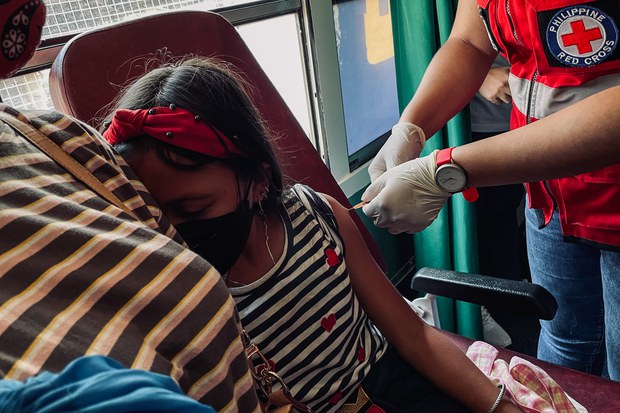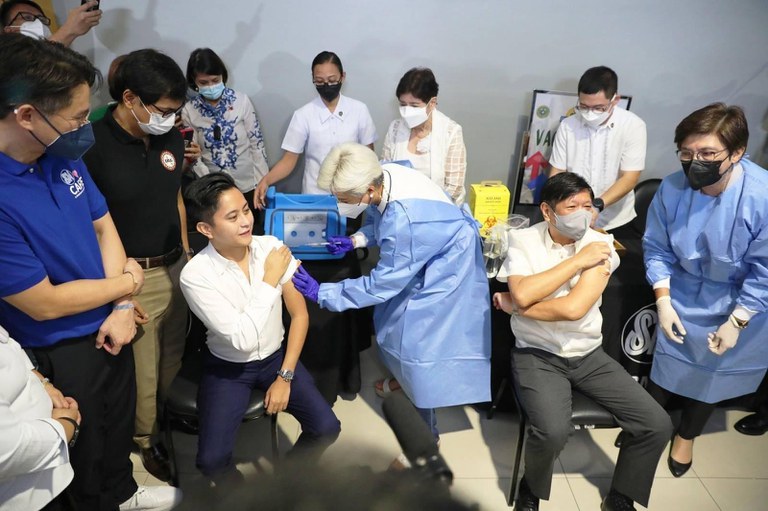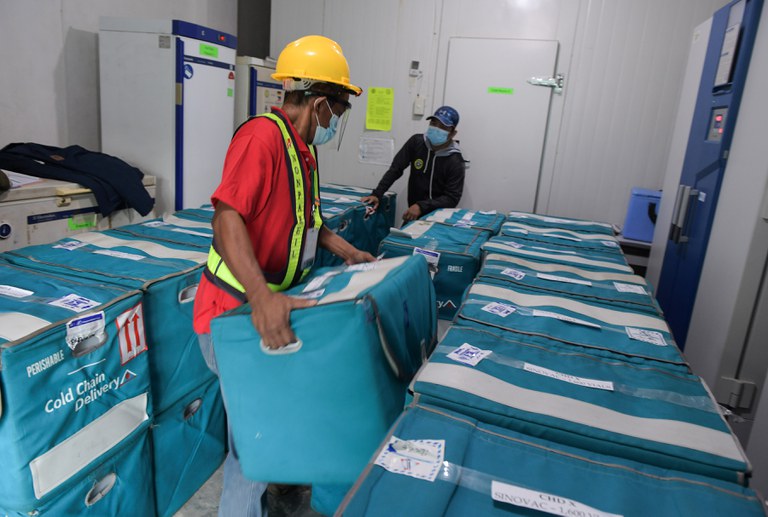Marcos: Philippines likely to keep COVID emergency status intact until year’s end
2022.08.17
Manila
 A young girl gets vaccinated against COVID-19 at an elementary school in Dagupan city, Philippines, June 6, 2022.
A young girl gets vaccinated against COVID-19 at an elementary school in Dagupan city, Philippines, June 6, 2022.
The Philippine government will likely keep a COVID-19 state of public health emergency going until the end of 2022, President Ferdinand Marcos Jr. announced Wednesday, saying the country needs international vaccine aid to continue flowing in as it still fights the pandemic.
Marcos said he discussed lifting the more than two-year-old state of emergency with his health officials, but they advised him that the country needed ongoing vaccine assistance. The president received his second coronavirus vaccine booster shot on Wednesday.
The newly elected president said he and acting Health Secretary Maria Rosario Vergeire believed that “the international medical community extends more help under a state of emergency.”
“WHO (World Health Organization) is one of them. And if we lift the state of emergency, it will stop,” Marcos said, referring to the flow of COVID-19-related aid into the Southeast Asian nation.
“So, we will likely extend it until the end of the year,” he said of the emergency declaration, but did not elaborate.
On Tuesday, the Department of Health logged 2,633 new COVID-19 cases, increasing the Philippines’ total caseload to 3,838,062.
So far, the country has 36,190 active COVID-19 cases. The government, meanwhile, is aiming to fully incoluate 78 million of the nation’s total population of 110 million against the virus.
In March 2020, Marcos’ immediate predecessor, Rodrigo Duterte, placed the entire country under a state of public emergency and imposed lockdowns amid the public health crisis.
School children were pulled out of classrooms and jobs and businesses were shut down, in what still is considered one of the world’s longest lockdowns.
During his first State of the Nation Address before Congress last month, Marcos ruled out extending the lockdowns that have crippled the economy. Instead, he promised a stronger health system that would bring vaccines and healthcare to remote communities.
As of June, the Philippines had received a total of 245.3 million doses of COVID-19 vaccines, of which about 74.2 million doses were donated by COVAX. Some 35.7 million doses from the facility were donated by the U.S government.
Since February last year, the Philippines had procured COVID-19 vaccines made by various manufacturers, which include Pfizer BioNTech, Moderna, Johnson & Johnson, Sinovac, AstraZeneca, Sputnik V, Sputnik Light and Sinopharm.

On Wednesday, the president called on allies in Congress to amend current procurement laws to allow the government to move faster during emergencies.
The president, who recently recovered from a COVID-19 infection himself, urged the public to get booster shots to protect themselves from the newer strains of the virus that are believed to be even more dangerous.
“That is why we are campaigning for booster shots especially now that we are slowly opening up the economy,” Marcos stressed. “We don’t want another lockdown. We also want to remove wearing masks as a protocol. We won’t achieve that if we don’t get booster shots now.”
The president also sought to dispel some fears in the public that vaccines could be dangerous, by saying that those who may have died or fallen ill were likely suffering from other diseases.
“It is clear that those who died were suffering from comorbidity,” he said, adding that he had his booster shot publicly taken “to show everyone it is safe, it is effective and it is needed.”

More than two years into the crisis, vaccine hesitancy, particularly in the remote pockets of the archipelago, remains a problem.
This can be traced to a dengue immunization program in 2017 that was suspended when French drugmaker Sanofi admitted that, in some cases, its vaccine, called Dengvaxia, caused a severe form of the disease.
More than 830,000 school children had received it by the time the program was halted, and while there were some deaths linked to the vaccination, that causal link was not conclusively proven.
That sad episode often comes up in dialogues between health officials and suspicious civilians, health officials have said.
Former Health Secretary Janette Garin, now a member of the House of Representatives, said the Dengvaxia scare had been unnecessarily fanned by some quarters who sought publicity points against the former administration of then-President Benigno Aquino.
And Aquino’s successor, Duterte, did little to help combat the problem when he had himself publicly injected with an unapproved COVID-19 vaccine developed by China’s Sinopharm, instead of the one by Sinovac, which the health department had approved. Duterte apologized for the gaffe.
“The scare was an output of some politicians being lured into the anti vaxxers and anti-industry den. And they are not being held accountable for the lives lost because of infodemic,” Garin told BenarNews.







